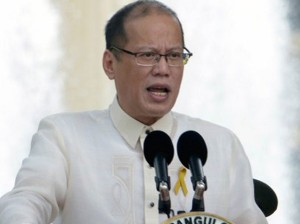MANILA, Philippines—President Aquino on Tuesday rallied Navy chiefs in Southeast Asia to protect the “common seas” by ensuring freedom of navigation, which is central to the dispute in the West Philippine Sea.
Speaking before regional Navy commanders, the President said the present times demand that countries in the region seek ways to “expand and strengthen our partnerships” around the seas.
“The early years of our civilizations, our peoples have looked at the waters that surround us and seen nautical highways to cooperation and friendship,” Aquino said.
He said the Philippines and the rest of the Association of Southeast Asian Nations (Asean) have always striven to uphold “our individual sovereignty” but at the same time fostered a “strong sense of regional solidarity.”
“One that favors consensus and collaboration instead of discord, aggression and imposition,” he said at the Seventh Asean Navy Chiefs’ Meeting at a Makati hotel.
Goals
It is in conferences like this that all the Southeast Asian countries could make progress to “solidify our ties and protect our common seas,” Aquino said.
He said the goals are: freedom of navigation, the safety of commercial vessels, and the security of their civilian passengers.
These goals are important in the light of the Asean Economic Community which the regional group intends to establish by 2015, he said.
The Asean Navy Chiefs Meeting is an annual activity of heads of the naval services of Brunei, Cambodia, Indonesia, Malaysia, Burma (Myanmar), Singapore, Thailand, Vietnam and the Philippines.
Bitter dispute
The Philippines is engaged in a bitter dispute with China over territories in the West Philippine Sea, internationally known as the South China Sea.
As its military and economic might grows, China has been asserting its territorial claims more aggressively, which the Philippines has questioned before the United Nations.
Three island groups are at the center of dispute, including the Spratlys, a chain of up to 190 islands, reefs, coral outcrops and banks believed to be sitting atop large deposits of oil and natural gas.
The South China Sea is being claimed in its entirety by China and in parts by Asean members the Philippines, Brunei, Vietnam and Malaysia, as well as Taiwan.
Code of conduct
Asean has been pushing for a code of conduct that would replace the Declaration of the Conduct of Parties in the South China Sea, a 2002 nonaggression pact that has failed to stop clashes in the international waterway. China has argued that the time wasn’t ripe yet.
The Philippines and the United States have vowed to ensure freedom of navigation in the West Philippine Sea.
In his speech, the President expressed confidence the Navy chiefs’ meeting would lead to sharing of lessons in maritime patrols, search and rescue operations, or the interdiction of pirates and other security threats.
“While the stories of cooperation between our peoples through the centuries already fill the pages of our history books, I am hopeful that, together, through meetings such as this, we can extend those narratives and write even more chapters about how we have worked together to sustain a peaceful and prosperous Asean region,” he said.
“Perhaps I can leave you with one thought: Communication leads to cooperation, which enhances stability for the region leading to prosperity for all,” he said.
